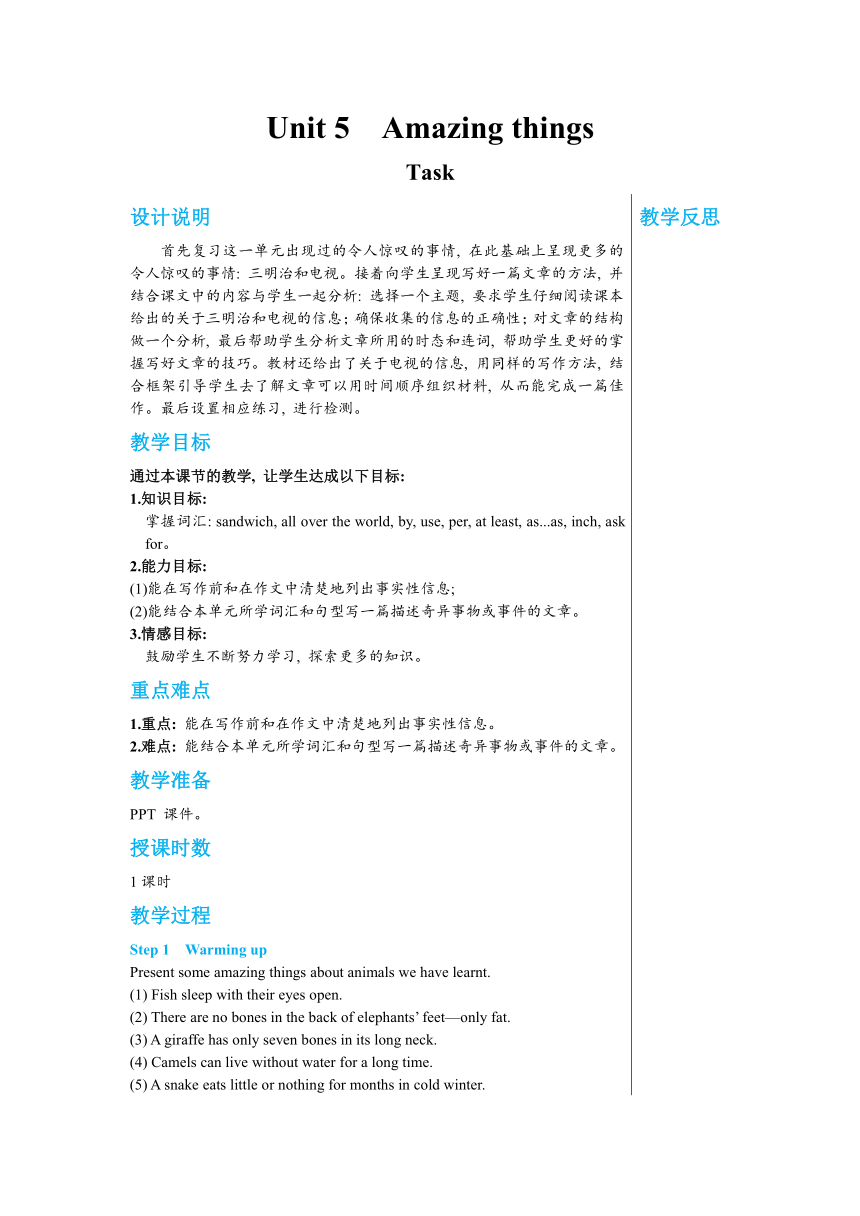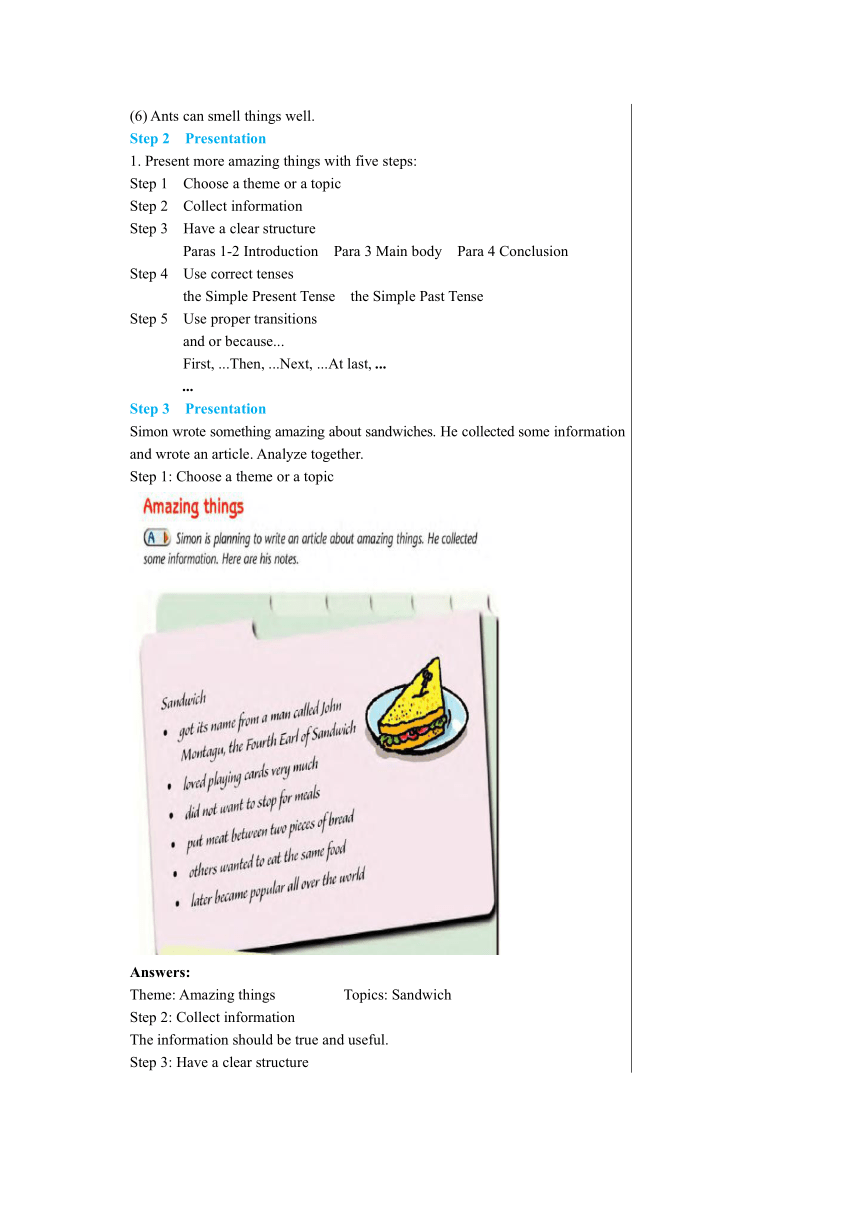Unit 5 Task教学详案-译林牛津版初中英语七年级(下)
文档属性
| 名称 | Unit 5 Task教学详案-译林牛津版初中英语七年级(下) |

|
|
| 格式 | docx | ||
| 文件大小 | 1.3MB | ||
| 资源类型 | 试卷 | ||
| 版本资源 | 牛津译林版 | ||
| 科目 | 英语 | ||
| 更新时间 | 2024-02-21 19:45:06 | ||
图片预览



文档简介
Unit 5 Amazing things
Task
设计说明 首先复习这一单元出现过的令人惊叹的事情, 在此基础上呈现更多的令人惊叹的事情: 三明治和电视。接着向学生呈现写好一篇文章的方法, 并结合课文中的内容与学生一起分析: 选择一个主题, 要求学生仔细阅读课本给出的关于三明治和电视的信息;确保收集的信息的正确性;对文章的结构做一个分析, 最后帮助学生分析文章所用的时态和连词, 帮助学生更好的掌握写好文章的技巧。教材还给出了关于电视的信息, 用同样的写作方法, 结合框架引导学生去了解文章可以用时间顺序组织材料, 从而能完成一篇佳作。最后设置相应练习, 进行检测。 教学目标 通过本课节的教学, 让学生达成以下目标: 1.知识目标: 掌握词汇: sandwich, all over the world, by, use, per, at least, as...as, inch, ask for。 2.能力目标: (1)能在写作前和在作文中清楚地列出事实性信息; (2)能结合本单元所学词汇和句型写一篇描述奇异事物或事件的文章。 3.情感目标: 鼓励学生不断努力学习, 探索更多的知识。 重点难点 1.重点: 能在写作前和在作文中清楚地列出事实性信息。 2.难点: 能结合本单元所学词汇和句型写一篇描述奇异事物或事件的文章。教学准备 PPT 课件。 授课时数 1课时 教学过程 Step 1 Warming up Present some amazing things about animals we have learnt. (1) Fish sleep with their eyes open. (2) There are no bones in the back of elephants’ feet—only fat. (3) A giraffe has only seven bones in its long neck. (4) Camels can live without water for a long time. (5) A snake eats little or nothing for months in cold winter. (6) Ants can smell things well. Step 2 Presentation 1. Present more amazing things with five steps: Step 1 Choose a theme or a topic Step 2 Collect information Step 3 Have a clear structure Paras 1-2 Introduction Para 3 Main body Para 4 Conclusion Step 4 Use correct tenses the Simple Present Tense the Simple Past Tense Step 5 Use proper transitions and or because... First, ...Then, ...Next, ...At last, ... ... Step 3 Presentation Simon wrote something amazing about sandwiches. He collected some information and wrote an article. Analyze together. Step 1: Choose a theme or a topic Answers: Theme: Amazing things Topics: Sandwich Step 2: Collect information The information should be true and useful. Step 3: Have a clear structure Theme: Amazing things Topic: Sandwiches Facts and details: Feeling: amazing Step 4: Use correct tenses Use simple present tense to talk about the present. For example, live, like, do and isn’t. Use simple past tense to talk about the past. For example, got, loved, did not, put, wanted, asked, and became. Step 5: Use proper transitions In his article, he uses “but” and “so”. Step 4 Writing Linda wants to write about TVs. 1. Pay attention to the numbers in the information. Ask students to try time order while writing. 2. Use the structure to help them. Step 5 Language points 1. We live in a wonderful world with a lot of amazing things. 我们生活在一个有着很多令人惊讶的事情的精彩世界里。 with 短语在句中作后置定语, 修饰a wonderful world。 China is a country with a long history. 中国是一个有着悠久历史的国家。 2. Sandwich got its name from a man called John Montagu, the Fourth Earl of Sandwich. 三明治这个名字是从一个叫做约翰·蒙塔古, 也就是三明治伯爵四世那儿获得的。 (1) get...from...从……获得…… Lucy got a new pencil from her brother. 露西从哥哥那里得到了一支新铅笔。 (2) a man called...一个叫做……的人, called过去分词在句中作后置定语, 修饰a man。 The girl called Lily is my best friend. 那个叫莉莉的女孩是我最好的朋友。 3. The man loved playing cards with his friends very much. 这名男士非常喜欢和他的朋友们打牌。 play cards 打牌。 play的宾语如果是体育类活动, 不能用冠词the; 如果是乐器类名词作宾语, 则必须加上冠词the。 play basketball打篮球 play the piano弹钢琴 4. He did not want to stop for meals…他不想停下来去吃饭…… stop for meals=stop to have meals 停下来去吃饭 stop to do sth.停下来去做某事 stop doing sth.停止做某事 You can stop for a coffee.你可以停下来喝杯咖啡。 5. …so they asked for a “sandwich.” ……因此他们要一个“三明治”。 ask for...要…… ask for a new bike要一辆新自行车 ask sb. for sth.向某人寻求某物 ask us for help 向我们寻求帮助 6. by 1935…in use到1935年为止……在使用 by到……为止 be in use 在使用中 The computer is in use.电脑在使用中。 类似的短语: in trouble处在困境中 in danger处在危险中 7. per 100 families=every 100 families 每100个家庭 8. now TVs can be as large as 152 inches 现在电视可以有152 英寸那么大 as...as 和……一样 as large as = the same size as和……一样大 Step 6 Homework 1. Review all the new words and language points in this unit. 2. Choose one topic to write an article about an amazing thing after class, using Simon’s article as a model. 当堂达标 Ⅰ. 单项选择 1. I stopped the night in a small village while I was on holiday in the Himalayas a few years ago. A. at B. for C. until D. through 2. — Would you like to give me salt, please —Sorry. There is in the bag. A. some; little B. any; a little C. any; little D. some; a little 3. The little dog got its name its owner. A. with B. before C. from D. for 4. I think people can’t live water. A. with B. in C. without D. and 5. —Why are you so —Because I read a story just now. Have a look! A. surprised; surprised B. surprising; surprised C. surprising; surprising D. surprised; surprising 6. —Will you play table tennis with us this afternoon — . I will go on a class trip. A. I think so B. I’d like to C. I’m afraid not D. OK Ⅱ. 根据汉语提示或用括号内所给单词的适当形式填空 1. The (one) TV show was in the UK in 1926. 2. In China, most families have at (little) one TV now. 3. — Which programme are you watching on TV now — A literary (文学的) reading programme (call) “Letters Alive”. 4. The children (leave) the park five minutes ago. 5. Do you know (something) about that old man 6. I had two (piece) of (sandwich) for lunch. 7. I think he is five (foot) six (inch) tall. 8. I have a new classmate (name) Alice. 9. His drawing is as (good) as mine. 10. We celebrate Teachers’ Day by (give) teachers cards. Answers:Ⅰ.1-6 BACCDC Ⅱ. 1. first 2. least 3. called 4. left 5. anything 6. pieces, sandwiches 7. feet, inches 8. named 9. good 10. giving 板书设计 Unit 5 Amazing things Tasksandwich, all over the world, by, use, per, at least as...as, inch, ask fora. get...from...从……获得 a man called...一个叫做……的人 b. play cards play的宾语如果是体育类活动, 不能用冠词the; 如果是乐器类名词作宾语, 则必须加上冠词the。 c. stop for meals=stop to have meals stop to do sth. stop doing sth. d. ask for... ask sb. for sth. ask us for help e. by 1935 be in use in trouble 处在困境中 in danger 处在危险中 f. per 100 families = every 100 families g. as...as as large as = the same size as
教学反思
Task
设计说明 首先复习这一单元出现过的令人惊叹的事情, 在此基础上呈现更多的令人惊叹的事情: 三明治和电视。接着向学生呈现写好一篇文章的方法, 并结合课文中的内容与学生一起分析: 选择一个主题, 要求学生仔细阅读课本给出的关于三明治和电视的信息;确保收集的信息的正确性;对文章的结构做一个分析, 最后帮助学生分析文章所用的时态和连词, 帮助学生更好的掌握写好文章的技巧。教材还给出了关于电视的信息, 用同样的写作方法, 结合框架引导学生去了解文章可以用时间顺序组织材料, 从而能完成一篇佳作。最后设置相应练习, 进行检测。 教学目标 通过本课节的教学, 让学生达成以下目标: 1.知识目标: 掌握词汇: sandwich, all over the world, by, use, per, at least, as...as, inch, ask for。 2.能力目标: (1)能在写作前和在作文中清楚地列出事实性信息; (2)能结合本单元所学词汇和句型写一篇描述奇异事物或事件的文章。 3.情感目标: 鼓励学生不断努力学习, 探索更多的知识。 重点难点 1.重点: 能在写作前和在作文中清楚地列出事实性信息。 2.难点: 能结合本单元所学词汇和句型写一篇描述奇异事物或事件的文章。教学准备 PPT 课件。 授课时数 1课时 教学过程 Step 1 Warming up Present some amazing things about animals we have learnt. (1) Fish sleep with their eyes open. (2) There are no bones in the back of elephants’ feet—only fat. (3) A giraffe has only seven bones in its long neck. (4) Camels can live without water for a long time. (5) A snake eats little or nothing for months in cold winter. (6) Ants can smell things well. Step 2 Presentation 1. Present more amazing things with five steps: Step 1 Choose a theme or a topic Step 2 Collect information Step 3 Have a clear structure Paras 1-2 Introduction Para 3 Main body Para 4 Conclusion Step 4 Use correct tenses the Simple Present Tense the Simple Past Tense Step 5 Use proper transitions and or because... First, ...Then, ...Next, ...At last, ... ... Step 3 Presentation Simon wrote something amazing about sandwiches. He collected some information and wrote an article. Analyze together. Step 1: Choose a theme or a topic Answers: Theme: Amazing things Topics: Sandwich Step 2: Collect information The information should be true and useful. Step 3: Have a clear structure Theme: Amazing things Topic: Sandwiches Facts and details: Feeling: amazing Step 4: Use correct tenses Use simple present tense to talk about the present. For example, live, like, do and isn’t. Use simple past tense to talk about the past. For example, got, loved, did not, put, wanted, asked, and became. Step 5: Use proper transitions In his article, he uses “but” and “so”. Step 4 Writing Linda wants to write about TVs. 1. Pay attention to the numbers in the information. Ask students to try time order while writing. 2. Use the structure to help them. Step 5 Language points 1. We live in a wonderful world with a lot of amazing things. 我们生活在一个有着很多令人惊讶的事情的精彩世界里。 with 短语在句中作后置定语, 修饰a wonderful world。 China is a country with a long history. 中国是一个有着悠久历史的国家。 2. Sandwich got its name from a man called John Montagu, the Fourth Earl of Sandwich. 三明治这个名字是从一个叫做约翰·蒙塔古, 也就是三明治伯爵四世那儿获得的。 (1) get...from...从……获得…… Lucy got a new pencil from her brother. 露西从哥哥那里得到了一支新铅笔。 (2) a man called...一个叫做……的人, called过去分词在句中作后置定语, 修饰a man。 The girl called Lily is my best friend. 那个叫莉莉的女孩是我最好的朋友。 3. The man loved playing cards with his friends very much. 这名男士非常喜欢和他的朋友们打牌。 play cards 打牌。 play的宾语如果是体育类活动, 不能用冠词the; 如果是乐器类名词作宾语, 则必须加上冠词the。 play basketball打篮球 play the piano弹钢琴 4. He did not want to stop for meals…他不想停下来去吃饭…… stop for meals=stop to have meals 停下来去吃饭 stop to do sth.停下来去做某事 stop doing sth.停止做某事 You can stop for a coffee.你可以停下来喝杯咖啡。 5. …so they asked for a “sandwich.” ……因此他们要一个“三明治”。 ask for...要…… ask for a new bike要一辆新自行车 ask sb. for sth.向某人寻求某物 ask us for help 向我们寻求帮助 6. by 1935…in use到1935年为止……在使用 by到……为止 be in use 在使用中 The computer is in use.电脑在使用中。 类似的短语: in trouble处在困境中 in danger处在危险中 7. per 100 families=every 100 families 每100个家庭 8. now TVs can be as large as 152 inches 现在电视可以有152 英寸那么大 as...as 和……一样 as large as = the same size as和……一样大 Step 6 Homework 1. Review all the new words and language points in this unit. 2. Choose one topic to write an article about an amazing thing after class, using Simon’s article as a model. 当堂达标 Ⅰ. 单项选择 1. I stopped the night in a small village while I was on holiday in the Himalayas a few years ago. A. at B. for C. until D. through 2. — Would you like to give me salt, please —Sorry. There is in the bag. A. some; little B. any; a little C. any; little D. some; a little 3. The little dog got its name its owner. A. with B. before C. from D. for 4. I think people can’t live water. A. with B. in C. without D. and 5. —Why are you so —Because I read a story just now. Have a look! A. surprised; surprised B. surprising; surprised C. surprising; surprising D. surprised; surprising 6. —Will you play table tennis with us this afternoon — . I will go on a class trip. A. I think so B. I’d like to C. I’m afraid not D. OK Ⅱ. 根据汉语提示或用括号内所给单词的适当形式填空 1. The (one) TV show was in the UK in 1926. 2. In China, most families have at (little) one TV now. 3. — Which programme are you watching on TV now — A literary (文学的) reading programme (call) “Letters Alive”. 4. The children (leave) the park five minutes ago. 5. Do you know (something) about that old man 6. I had two (piece) of (sandwich) for lunch. 7. I think he is five (foot) six (inch) tall. 8. I have a new classmate (name) Alice. 9. His drawing is as (good) as mine. 10. We celebrate Teachers’ Day by (give) teachers cards. Answers:Ⅰ.1-6 BACCDC Ⅱ. 1. first 2. least 3. called 4. left 5. anything 6. pieces, sandwiches 7. feet, inches 8. named 9. good 10. giving 板书设计 Unit 5 Amazing things Tasksandwich, all over the world, by, use, per, at least as...as, inch, ask fora. get...from...从……获得 a man called...一个叫做……的人 b. play cards play的宾语如果是体育类活动, 不能用冠词the; 如果是乐器类名词作宾语, 则必须加上冠词the。 c. stop for meals=stop to have meals stop to do sth. stop doing sth. d. ask for... ask sb. for sth. ask us for help e. by 1935 be in use in trouble 处在困境中 in danger 处在危险中 f. per 100 families = every 100 families g. as...as as large as = the same size as
教学反思
